 |
PART 01
We live in times when more than one billion women, or one in three women, around the world do not have access to safe sanitation while one in ten women do not have access to clean water. Today dirty water kills more women than cancer. Half of India's 445 rivers are too polluted for drinking. Presently the richest one percent of the world own more than the rest of humanity combined. A Mumbai-based medical second opinion services center has revealed that 44 percent of suggested surgeries were needless. One third of the food produced in the world is wasted while 870 million go to bed without food everyday. Indiscriminate human action is showing up as environmental crisis like never before, and technology and globalization has made us so interconnected that acts of avarice in one corner of the world seems to affect the poor man in the other.
This does seem to be a real pickle we have got ourselves into. We generally tend to look for new solutions for new crises, and in the process we create new issues. Any reference to values, austerities or spirituality as solutions is often mocked at as regressive. In a sense it is not completely right to blame the younger generation for such contempt, for what has been lacking is the presenting of this time-tested wisdom in the modern context. We do teach our children that the solution for all problems lies in Bhagawan's message, but what we need to do is help them see that message in the background of the modern day happenings. And that is where the works and writings of Prof. G. Venkataraman have always stood out. With his immense knowledge of history and current affairs, and his passion to point out to the relevance of Bhagawan's message in this time and age and for the future, his writings always make for inspiring and interesting reading.
If we were to define in one phrase the problem we face in the world today, we could probably say 'decline in Dharma' - Dharma being a word pregnant with meaning and wisdom. No wonder Bhagawan wrote an entire book explaining this one value. 'Dharma Vahini', which was a series of articles written by Bhagawan for the Sanathana Sarathi and later compiled into a book, describes and dilates on the various nuances of Dharma. And Prof. Venkataraman's musings series on this Vahini presents in modern context this wonderful book's timeless wisdom. This series we begin today is the transcript with illustrations of the musings series aired on Radio Sai in 2007-08. You can look forward to a new part of this series on the 13th of every month. This too is part of the Radio Sai offerings for the 90th year of the Divine Advent. For how can the celebration of the life of our Divine Master be complete without a sincere study of His message. So let us with prayers, join Prof. Venkataraman in this journey through the Dharma Vahini.
Loving Sai Ram and greetings from Prasanthi Nilayam. For quite some time, I have been thinking about revisiting the famous Vahiniseries of books written by Swami decades ago. In the early years when books on Swami were very few, people took eagerly to those written by Swami Himself and, as a result, the Vahini series became quite popular. However, as the years rolled by, books written by devotees began to appear in large numbers, and since these invariably contained the ever-popular "experiences", slowly devotees began to forget the Vahinis. And soon there came a time when people did not even know that such books existed!
Over here, we made sure that at least our students did not suffer through such ignorance. This we ensured by anchoring the so-called Awareness Classes for the undergraduates to the various Vahinis of Bhagawan. But where the wide world was concerned, the ignorance about the Vahinis not only persisted but in fact grew to astronomical proportions.
I am personally concerned about this unfortunate development because when people sideline the direct teachings of the Avatar even when He is not physically amidst us, then it is something pretty serious. What is even more disturbing is the growing belief that teachings of Swami need not be taken seriously, except those convenient to us. Particularly where Dharma is concerned, this coolness is alarming.
I often check with various people about what they feel concerning corruption, a problem that afflicts massively not only India but many parts of the world as well. Almost always, the response I get is very depressing. Some, especially the young, say, "Listen, this is a different day and age; corruption is here to stay; we just cannot do anything about it. No point wasting time trying to fight it; just learn to live with it; that's much simpler!" We also get mail along similar lines from devotees working in big companies. They write, "In our company, we call it speed money, paid for services rendered. In business such things are required you know!" So the feeling seems to be, "If you cannot fight it, ignore it!"
The 'Slippery Slope' in the Path of Practising Dharma
This is what is called the slippery slope. First you shrug off paying bribes, even though you do not like it one bit. Then you try to legitimise with it with suitable arguments. In many cases where direct corruption is not involved but some kind of unethical action is, powerful lobbies try to see if money power can be used to get legislation passed so that illegitimate and immoral activities get legal sanction. If you look carefully at many of the issues connected with intellectual property, patents, and even international trade laws, you would find there is amazing and blatant one-sidedness.
I do not want to get embroiled in a debate on these kinds of issues; but this much I shall and will say: No matter what, we simply cannot afford to be a party to the violation of Dharma, indeed, under any circumstances. This of course is likely to raise hackles, and this precisely is where I wish to bring in the Vahini series. Through the present series of broadcasts, I wish to recall in simple language, to listeners young and old, some of the things Swami wrote and spoke about passionately in former years.
How 'Dharma Vahini' Came About
May be at this juncture, I should say a few words introducing the Vahini series itself. Soon after the present Mandir was established and devotees started coming in larger and larger numbers, Swami founded the Sanathana Sarathi. For decades, it was the lifeline and the umbilical cord for devotees to get spiritual nourishment, once they left this place. Apart from a presentation of the Divine Discourses in print form, an activity that continues to form the core of Sanathana Sarathi to this day, Swami, in response to numerous requests, including from late Mr. Kasturi, started writing articles on specific themes, like Dharma, Prema and so forth. In due course, these individual articles were compiled and packaged into books, and that is how the Vahini series came into existence.
Naturally, the original text of each and every one of these books was in Telugu. It was left to Prof. Kasturi to translate these into English so that these wonderful books became accessible to a much larger audience, especially international. It is pertinent to quote Kasturi himself at this point. This is what he says in the preface to the volume Dharma Vahini:
This little book contains the articles written by Bhagawan Sri Sathya Sai Baba in the series "Dharma Vahini" for the "Sanathana Sarathi," the monthly journal published from Prasanthi Nilayam. They are given here in English, but it must be said that the original Telugu is simpler and sweeter. It is difficult to express in English the fundamental ideas of Indian Culture, for English is strange to the translator and perhaps to many a reader; the English vocabulary does not offer satisfactory equivalents to many words that form the common currency of Indian languages.
It is the authentic Voice of the Divine Phenomenon, that is setting right the moral codes and behaviour of millions of men and women today.
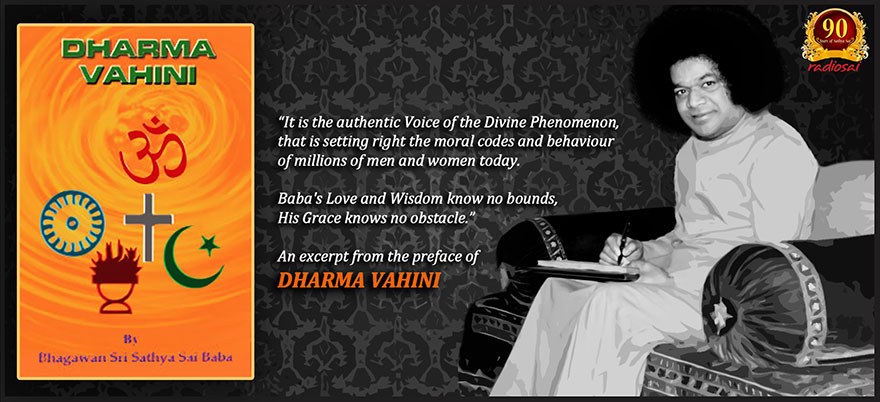 |
Baba's Love and Wisdom know no bounds, His Grace knows no obstacle. He is no hard taskmaster; His solicitude for our welfare and real progress is overwhelming. May this book reveal to you the Mother's love which has made Baba write it, the Father's authority which backs every junction therein, the Teacher's illumination that lights up every statement, and the Lord's sublime Universality, that invites you to expand your personality into a great Instrument of Service.
That was what Kasturi said of the Vahinis, and that also concludes my general introduction. Let me now tell you what exactly I am planning to do. Basically, I am going to present a selection of passages from the book Dharma Vahini, written in Telugu by Swami Himself and translated into English by Prof. Kasturi. From the copy of this book that I have, I am not able to find out when exactly the first edition of this book was published; however, that is not so very important. Dharma is eternal, God is eternal and when God in human form speaks about Dharma, we had better sit up and take serious notice; that is what motivated me to doing this particular musings series.
Where Dharma is concerned, I can go to town since I feel so passionately about it! However, that is NOT my objective here. Rather, I wish to bring to your notice, what Swami said in His classic, Dharma Vahini. As I mentioned earlier, I am offering only select extracts; I do hope this series would induce at least some of you to go to the book itself and read it carefully. As far as I am concerned, I have selected a few passages that I personally feel are important and simply cannot be ignored. Clearly, such a preferential selection does involve a bit of bias but then this way, I have the flexibility of offering additional comments without making the entire exercise pretty heavy for today's audience. I do hope you would accept this rationale of mine.
Why Dharma
With that preamble, let me go to work. We all pray, "Swami, please shower Your Grace on me!" Swami says, "Sure Bangaru, nothing would give Me greater joy. But you know, there is something you must do to earn My Grace!" What is that? Well, this is what Swami Himself says, right at the beginning of His book:
Man must dedicate himself to Dharma and be engaged always in Dharma so that he may live in peace and the world may enjoy peace. He cannot acquire real Peace, nor can he win the Grace of the Lord through any means other than the Dharmic life.
I hope you get the message. To be eligible for Divine Grace, we must all follow Dharma!
You might wonder: "What is this Dharma you are talking about? How do you know I am not already following Dharma?" Good questions! In answer to the second question let me say, I honestly do not know who is following Dharma and who is not. All I am trying to do is bring to your notice what Swami wrote a long time ago. Sure I have not yet explained what precisely Swami means by Dharma; but then, that is what this series is all about!
Let us get back to the basic question, which is: What exactly is meant by Dharma? For this we turn to Swami Himself:
Dharma is the foundation for the welfare of humanity; it is the truth that is stable for all time. When Dharma fails to transmute human life, the world is afflicted by agony and fear, and also tormented by stormy revolutions. When the effulgence of Dharma fails to illumine human relationships, mankind is shrouded in the night of sorrow.
 |
Let us try to digest what we have just heard. Swami says that Dharma is the very foundation of humanity. He adds that if this foundation becomes weak, the world becomes afflicted with agony and fear, and is tormented by stormy revolutions. That last bit sounds familiar, does it not? I mean you look around, there are problems everywhere - in Asia, in the Middle East, in Africa, in Latin America, and even in Europe and North America – wherever you look, there are all kinds of problems. So we do have every reason to pause for a moment and ask, "Hey, could it be that the problems that humanity is facing today are in any way due to the observance of Dharma becoming weak?"
The Changing Contours of Dharmic Practice Today
This leads to a supplementary question: "When does one say that the observance of Dharma has become weak?" Swami Himself gives the answer. He says that Dharma APPEARS to become weak, when man fails to be inspired by it and transmute his life by tuning it to nobler principles. That is when Dharma appears to lose it effulgence and people start saying, "Oh, the days of Dharma are over."
Let us pause and ponder a bit.
I shall start with rather ordinary circumstances. I have had many people come to me and say, "Sir, I want to stay here and do some service. I am no longer in service and have retired. My pension is meagre and I cannot afford to live in Hyderabad, Bangalore or Chennai; those cities are too expensive. Over here, life is still manageable, and added to that, one can be in Swami's presence and have His Darshan daily. While living here and having Darshan, I also want to be of some use. Please can you fit me into some kind of a service activity?"
As I am expected to do, I ask, "Sir, but you must be having a family, sons and daughters. Don't you want to be with them?" A silence prevails and I quickly get the picture. Many a time when I ask such a question, the person I am speaking with breaks down, and weeping like a child says, "Sir, my sons are all in foreign countries and they do not even bother to see me, much less send me some money for sustenance."
I am not making this up; this phenomenon of parental neglect is quite common. It is almost a fact of current life. I am sure the sons and daughters would have their own side of the story, but I am not concerned with individual stories; I am concerned with Dharma and what Swami has to say about it.
How many times has Swami told youth in general and His students in particular: "Remember what the Vedas say: 'Mother is God, and father is God.' Take care of them in their old age." Sometime back the college boys staged a drama in Sai Kulwant Hall, centred around the mythological character Sravankumar, and his immortal service to his parents. Both his parents were old and also blind, and this young boy had to take care of them. One day, he gets killed while fetching water, the killing being due to an arrow shot carelessly by a hunter who happens to be none other than Emperor Dasaratha. I leave you to track that sad story and find out all that happened. But today, this is what I want to say. Swami was deeply moved watching this play being enacted. Watching from nearby, one gets the feeling that He is asking: "Why is it that our young people and for that matter the old too, are forgetting the basics of Dharma?"
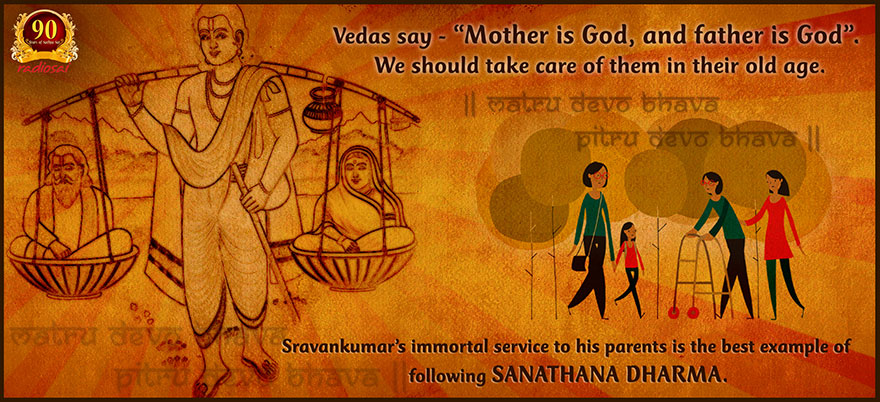 |
This anguish and concern on the part of Swami reflects the fact that Dharma, which once was taken for granted and regarded as part of our moral genes so to speak, has now been almost forgotten. What is even more alarming, I find that many people, especially the young, tend to feel that Dharma, while nice to talk about, will not work.
Listen now to what Swami says in Dharma Vahini about Dharma and its importance:
God is the embodiment of Dharma; His Grace is won by Dharma. He is ever fostering Dharma, He is ever establishing Dharma, He is Dharma Itself. In the scriptures of the various religions, Dharma is elaborated in the language familiar to the adherents. The stream of Dharmic activity should never run dry; when its cool waters cease to flow, disaster is certain.
The message is loud and clear: we just cannot afford to forget the practice and sustenance of Dharma for even a second becauseDharma is nothing but God Himself, a fact asserted by Swami Himself.
 |
Who is on the Path of Dharma
I know you are getting a bit impatient, wondering why I don't explain what exactly this Dharma is so that you can get a better idea of what it is that you are supposed to swear by. So here it comes!
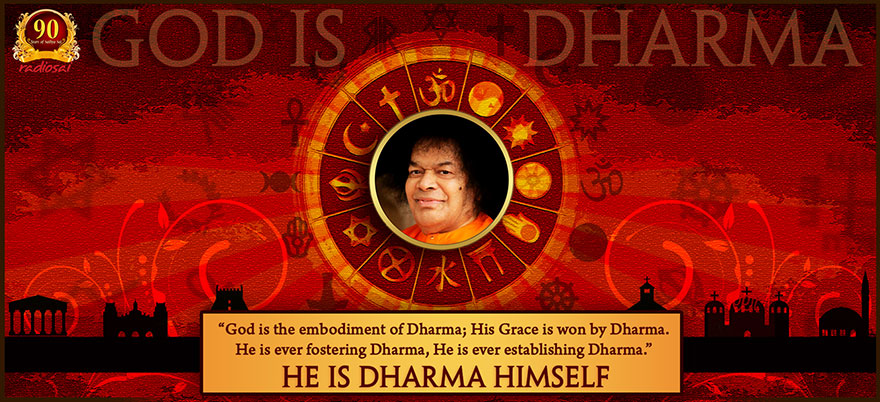 |
What is meant by Dharma? What is the essence of Dharma? Can man, common man, lead a happy life and survive if he sticks to Dharma? These doubts confuse the mind of man naturally in the course of his life. Solving them is necessary, even urgent. As soon as the word Dharma is mentioned, the ordinary man takes it to mean: The giving of alms, feeding and providing lodging to pilgrims, etc., the adherence to one's traditional profession or craft, law-abiding nature, the discrimination between right and wrong, the pursuit of one's innate nature or the freaks of one's own mind, the fruition of one's fondest desires, and so on.
Heard that? Well, that is what most of us think Dharma means, namely that it boils down essentially to giving charity, giving alms, and the usual righteous action. In a limited practical sense that is indeed correct. But you know something? Dharma means much more! Listen now to what Swami says in Dharma Vahini about all this:
Whoever subdues his egoism, conquers his selfish desires, destroys his bestial feelings and impulses and gives up the natural tendency to regard the body as the self, he is surely on the path of Dharma; he knows that the goal of Dharma is the merging of the wave in the sea.
The words we have just heard are very important and so let us try and digest them slowly. The first thing we learn is that for our actions to be truly righteous, certain conditions MUST be fulfilled. To start with, there must be no trace of ego in the action performed. Next, there must not be any trace of selfishness either. If we put these things together, it adds up the following simple formula: "Dharmic action is that which is free from body-consciousness."
Now of course, for simple folks like us, this might sound like replacing one confusion with another! You might well ask, and rightly so, "What is all this thing about body-consciousness?"
Well, if we pay careful attention to the many Discourses of Swami, we would find that a good many of them revolve around the dangers of body-consciousness and why we should avoid it meticulously.
The Purpose of Life
Many years ago, speaking to students, Swami asked: "What is the purpose of life?" Several answers were given but Swami kept on shaking His head as if to say, "No, that is not the correct answer." After a while when everyone gave up, Swami smiled and said slowly: "The purpose of life is simple; from God you have come and to God you must return. That is what you must be preoccupied with in life."
I am sure you would be taken aback to hear that but that is what it is! And this is where the entire issue of body-consciousness comes into the picture. We all think we are the body. Sure we have a body and the body is very important; otherwise, God would not have given it to us. At the same time, we must realise that the body has been given so that it can be an instrument to achieve the purpose of life, as spelt out for us by Swami. In other words, we should not think the body is given for pandering to it and as an instrument for the pursuit of sensual pleasures, etc. Such aberrations occur when we become obsessed with the body and give it far more importance than it merits.
If you are hearing all this for the first time – and it is likely that many of you indeed are – you might ask: "Listen, what is all this about body-consciousness? What else is there? Life is all about the body, is it not?" So it might seem to us, but those who know better say, "We are NOT the body! We are SOMETHING else!!" You might possibly not buy that but let me tell you that exactly is what Krishna told Arjuna five thousand years ago.
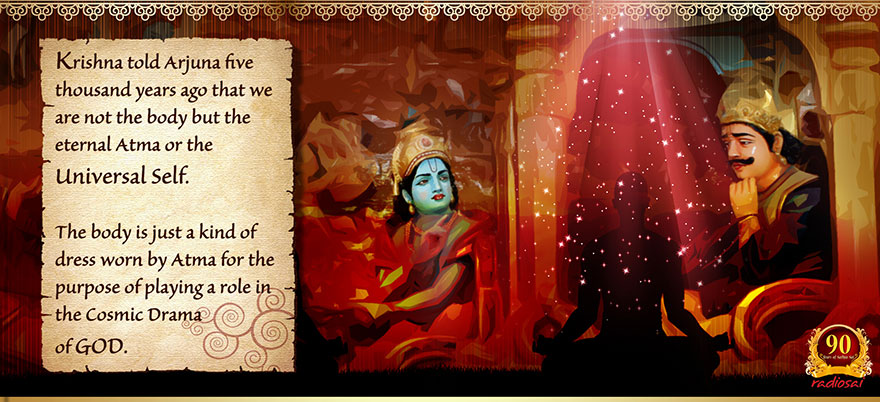 |
Krishna said, "Arjuna, you are not the body but the eternal Atma or the Universal Self. The body is just a kind of dress worn by Atma for the purpose playing a role in the Cosmic Drama of God."
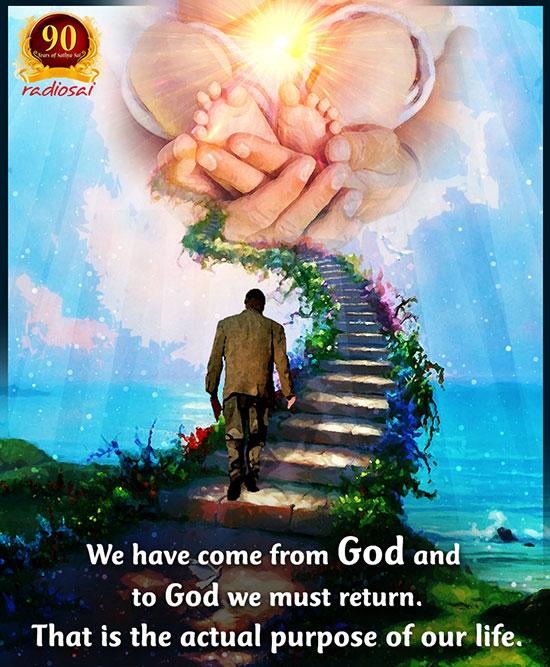 |
That is what Swami reminds us of again and again. He adds that we should, realising that we are the ImmortalAtma, act accordingly. In turn, this implies that while going through life, we must constantly strive to give up excessive attachment to the body, because such attachment would get us too much tied to the external world.
With that rather long background, I guess you would able to appreciate the quote I now offer.
The aim of Dharma is to make the individual give up the attachment to external nature and the illusion that the external world causes. Dharma must make the individual realise his or her True Reality or rather, un-realise what the individual has now taken as real, so that the life-principle may stand revealed in its genuine identity.
May be that quote appears difficult to understand. It requires detailed explanation and may be I shall postpone the explanation to the second article.
Meanwhile, before I wind up, allow me to make the following remarks by way of recalling some of the points made earlier:
1. The human being is really the Atma but with a dress called the human body [along with which, by the way, comes the all-important Mind].
2. God gives us the opportunity of birth in
human form not for frittering away life but for spending it such that we merge once and for all in God. The simple rule is: From God we have come and to God we must return; that, you will recall is how Swami describes the purpose of life.
3. If we accept that statement about the purpose of life, it immediately follows that every action of ours on earth must be tuned towards moving in the Godward direction.
4. Dharma is the compass that helps us to move in that direction.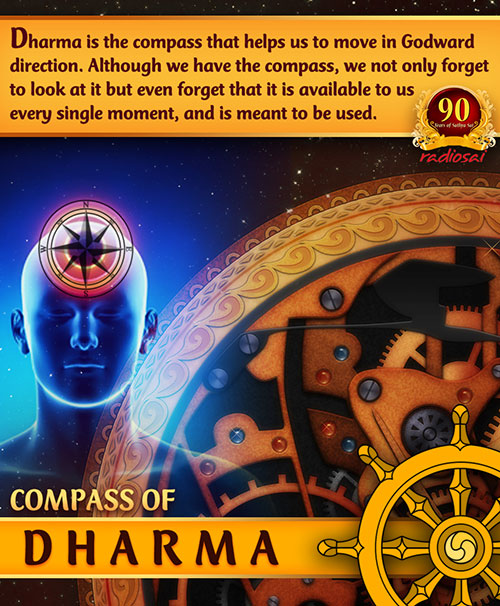
5. Although we have the compass, we not only forget to look at it constantly but even forget totally that it is available to us every single moment, and is meant to be used. When that happens, we get into deep trouble for sure.
6. What is it that causes such dangerous forgetfulness? In one word, it is body-consciousness. In practical terms, it means excessive preoccupation with the curios and fakes offered by the external world. For example, these days, many people, especially the young seem so preoccupied with telling all and sundry all about themselves via one of the numerous web sites created just for this purpose. They spend so much time sending text messages to each other, checking e-mails and what not. Do they spend even one minute thinking of God, their true nature and the purpose of life?
You might wonder what's wrong with all this. At the level of one individual, nothing catastrophic might happen but if indifference to Dharma spreads to millions and billions, then there can be trouble for all!
These are some of the things that Swami said and wrote four decades ago. The book may be forty years old but Dharma, the subject on which Swami wrote, is eternal and ever relevant. In fact, I would say, mankind has never needed Dharma so desperately as now; and that is why I have ventured to offer this Musings series.
So please do stay with us here in Radio Sai, as we slowly navigate through this most precious of Vahinis, the Dharma Vahini of Bhagawan Baba.
Take care and may God be with you always. Jai Sai Ram.
Posted on: May 13, 2015
 |
We live in times when more than one billion women, or one in three women, around the world do not have access to safe sanitation while one in ten women do not have access to clean water. Today dirty water kills more women than cancer. Half of India's 445 rivers are too polluted for drinking. Presently the richest one percent of the world own more than the rest of humanity combined. A Mumbai-based medical second opinion services centre has revealed that 44 percent of suggested surgeries were needless. One third of the food produced in the world is wasted while 870 million go to bed without food everyday. Indiscriminate human action is showing up as environmental crisis like never before, and technology and globalization has made us so interconnected that acts of avarice in one corner of the world seems to affect the poor man in the other.
This does seem to be a real pickle we have got ourselves into. We generally tend to look for new solutions for new crises, and in the process we create new issues. Any reference to values, austerities or spirituality as solutions is often mocked at as regressive. In a sense it is not completely right to blame the younger generation for such contempt, for what has been lacking is the presenting of this time-tested wisdom in the modern context. We do teach our children that the solution for all problems lies in Bhagawan's message, but what we need to do is help them see that message in the background of the modern day happenings. And that is where the works and writings of Prof. G. Venkataraman have always stood out. With his immense knowledge of history and current affairs, and his passion to highlight the relevance of Bhagawan's message in this time and age and for the future, his writings always make for inspiring and interesting reading.
If we were to define in one phrase the problem we face in the world today, we could probably say 'decline in Dharma' – Dharma being a word pregnant with meaning and wisdom. No wonder Bhagawan wrote an entire book explaining this one value. 'Dharma Vahini', which was a series of articles written by Bhagawan for the Sanathana Sarathi and later compiled into a book, describes and dilates on the various nuances of Dharma. And Prof. Venkataraman's musings series on this Vahini presents in modern context this wonderful book's timeless wisdom. This series is the transcript with illustrations of the musings series aired on Radio Sai in 2007-08. You can look forward to a new part of this series on the 13th of every month. This too is part of the Radio Sai offerings for the 90th year of the Divine Advent. For how can the celebration of the life of our Divine Master be complete without a sincere study of His message. So let us with prayers, join Prof. Venkataraman in this journey through the Dharma Vahini. Presented below is the second part of the series.
Loving Sairam. Greetings from Prasanthi Nilayam, and welcome to this special series offering reflections on Swami's invaluable book Dharma Vahini. I hope you recall where we left off last time. Just to refresh your memory, it was with the following quote of Swami:
Dharma cannot be restricted to any particular society or nation, for it is closely bound up with the fortunes of the entire living world. It is a flame of light that can never be extinguished. It is untrammelled in its beneficent action. Krishna taught the Gita to Arjuna. But He intended it for the whole of humanity; Arjuna was just an excuse. That very Gita is today correcting all mankind. It is not for any particular caste, religion or nation. It is the very breath for humans everywhere.
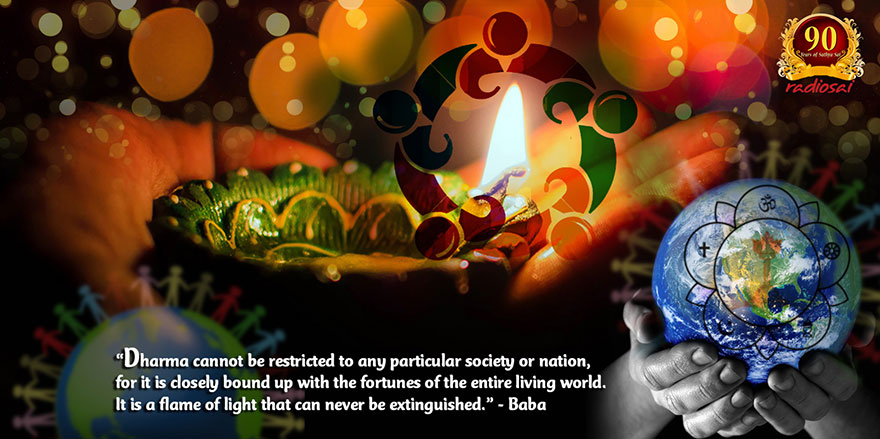 |
That was the quote I ended my last talk with. The following points emerge from that quote:
The whole of humanity, indeed every single human being is bound by Dharma. It is wrong to assume that Dharma is restricted to any country, race, community, sect, people professing any particular faith, etc.
By implication, Swami states that the Bhagavad Gita is all about Dharma. We will hear more about it later.
The third point, and this is very important, Gita and therefore Dharma are absolutely indispensable for today's society.
Finally, Dharma is the very breath of life. In other words, life that is Adharmic is no life at all. A person whose life is characterized by constant violation of Dharma, is as good as dead.
We now come to core concepts concerning Dharma. Before I quote Swami on this rather important topic, may be I could prepare the ground by making some clarifying remarks. To start with, I should mention that where Dharma is concerned, there is a fundamental principle to start with, followed by practical considerations. When we hear this for the first time, we tend to feel rather confused, but in actual fact, there is no need for any confusion. Let me explain it this way.
Now almost all countries have a written constitution, Britain being a prominent exception. The constitution invariably defines the basics, and within these basics, the country frames laws, usually via a legislative process. Laws thus passed are called Acts, and they are supposed to be in full conformity with the constitution. Sometimes there are disputes whether the act passed by the parliament is actually in conformity with the constitution or is in violation of it. In the event of such a dispute, a case is filed before the Supreme Court which is usually the final judicial authority. The constitutional bench of the Supreme Court then decides whether the act in question is in violation of the constitution or not. This is the way the legislative process works.
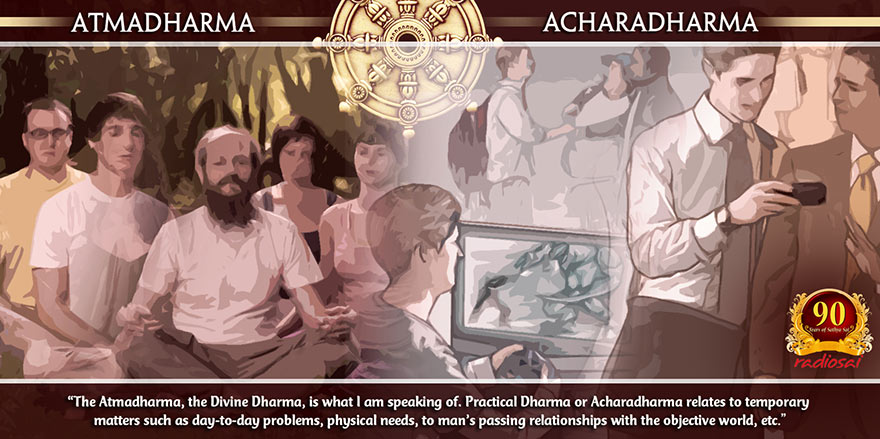 |
With this preamble, we are all set to hear what Swami says next. Watch out for two key words: The first is Atmadharma, and the second is Acharadharma or Practical Dharma. Over now to Swami:
The Atmadharma, the Divine Dharma, is what I am speaking of. Practical Dharma or Acharadharma relates to temporary matters such as day-to-day problems, physical needs, to man's passing relationships with the objective world, etc. The very instrument of those rules, the human body, is itself not permanent; how then can these issues, all of which are related to Practical Dharma be eternal? How can their nature be described as true?
Let us try to digest what we have just heard. It all boils down to what I referred to earlier, namely, a fundamental principle and the application of that principle to practical matters. The basic principle is called Atmadharma, and it is clear that this has to be the same for all; I mean we cannot have one basic principle for one person and another basic principle for another. Thus, according to Swami, Atmadharma is the same for all, from the king to pauper; that is it, and Atmadharma cannot be changed and it is non-negotiable. Thus, we can't have one basic principle today, another tomorrow and yet another the day after and so on. On the other hand, the practical application could well depend on situations that keep changing. For example, two hundred years ago, there was no meaning in asking the question: "Is it OK or not to travel in a train without a ticket?" There simply were no railway trains then!
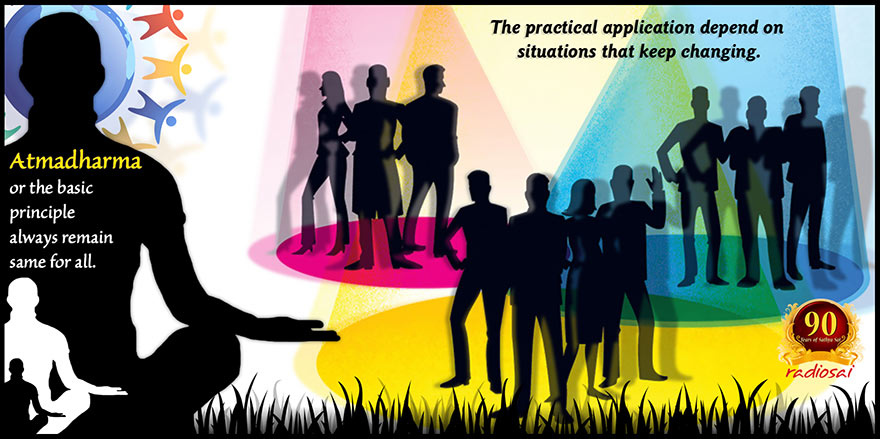 |
Hope you follow; the point is that the Basic Principle is always the same; however, in the practical application, one could continue to encounter new situations and every time one does so, one must analyse starting from first principles. So, it all boils down to: "How exactly does one apply this fundamental principle to practical and real-life situations?" There can be real sticky situations, and let me give you an example.
Let us say there is a patient who is in a coma and kept alive on a ventilator cum life support system. The patient is a vegetable, that is to say, brain-dead. The patient has been kept alive like this for years and years. Suddenly, a new patient comes, and this is an emergency. A ventilator and life support system is urgently needed for this person also, and there is none available except the one in which the brain-dead person is kept. If that is given to the second patient, he might survive and recover, and even lead a normal life. However, to provide the required facility to the second patient, the brain-dead person would have to be pulled out of the life-support system, which means that the brain-dead person would actually die immediately. So what does the doctor do?
He is caught in a real fix. The first patient sure needs the system and came there first. However, the person is brain dead, while the second person is not. That said, the second person is in a serious condition and badly needs a life-support system. Without it, the second person is dead but with it, the person could survive and even lead a normal life. So does the doctor vote for the brain-dead person who, according to medical opinion, will never wake up from the vegetable state or for the second person who might even lead a normal life? This is what is called a Moral dilemma or Dharmasangatam.
This is a real tough problem, and this is where the person has to ask sharp questions and seek the answers from the Conscience. By the way, the list of questions I gave earlier are just indicative and they would have to be tuned to each situation appropriately. In this case, the doctor concerned, who obviously would know the right questions to ask, would have to handle the situation with extreme sensitivity.
This raises the question: "What on earth is this sacred Basic Principle?" This is a fair question and a good knowledge of the Basic Principle would, in fact, help one to ask the right questions related to every situation one might encounter. So, let us turn to the Basic Principle. In other words, let us pose to ourselves the question: "What is this Atmadharma, and why is it so important?" Before I deal with that, I want you to first see the following:
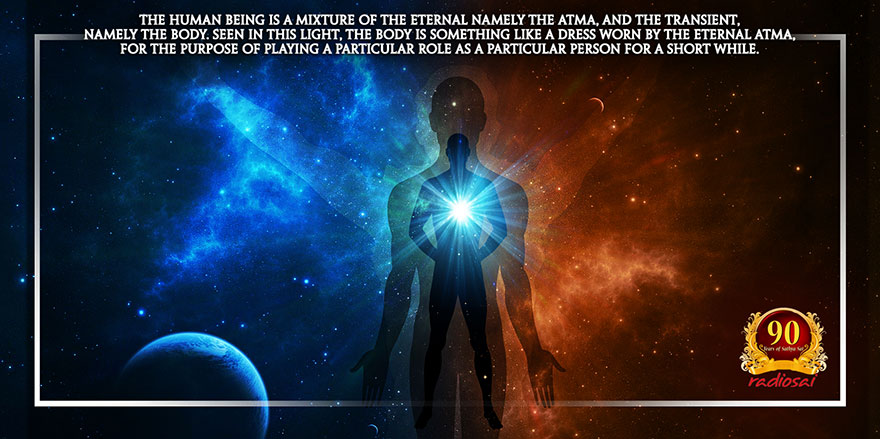 |
The Eternal cannot be expressed by the evanescent; Truth cannot reveal itself in untruth; Light cannot be procured from darkness. The Eternal can emerge only from the Eternal; Truth can emanate only from Truth. Therefore, the objective codes of Dharma relating to worldly activities and daily life, though important in their own sphere, have to be followed with the full knowledge and consciousness of the Inner Basic Atmadharma; then only can the internal and external urges co-operate and yield the Bliss of harmonious progress.
Now this is a very important quote, and I do hope you paid close attention to that. The essence of it is: Whatever be the nature of the practical action taken to meet the demands of a particular situation, it must be completely in alignment with Atmadharma.
Let us try to digest this. As Swami often reminds us, the human being is a mixture of the Eternal namely the Atma, and the transient, namely the body. Seen in this light, the body is something like a dress worn by the Eternal Atma, for the purpose of playing a particular role as a particular person for a short while.
I suppose you would not find it difficult to accept that. Now what makes the whole thing a bit more complex and also interesting is the presence of the Mind. You see, the human being is not just body plus the Atma but body plus the mind and the Atma. It is the mind that makes the whole thing a lot more complicated. Later we shall zoom in on the crucial role played by the mind. Now let us go back to the Swami's quote. He says: "The Eternal cannot be expressed by the evanescent; Truth cannot reveal itself in untruth; Light cannot be procured from darkness. The Eternal can emerge only from the Eternal; Truth can emanate only from Truth."
What this tells us is that when an action is performed by the transient body, guided and aided perhaps by the equally transient mind, it would be like candle light at best, light that can be blown off and get extinguished. Surely, we cannot let that happen, can we? Swami wants our actions should reflect the permanent and not the transient; only then would the action be really in accordance with Truth. Why must actions be harmony with Truth? For the simple and elementary reason that Truth is God and thus also Eternal. Keeping all this in mind, let us now try and connect the dots. We have the following facts.
We may appear to have a human form but in reality, the body is a mere dress covering the Eternal and Intangible Atma. This is just another way of saying we are NOT the body but the Eternal Atma!
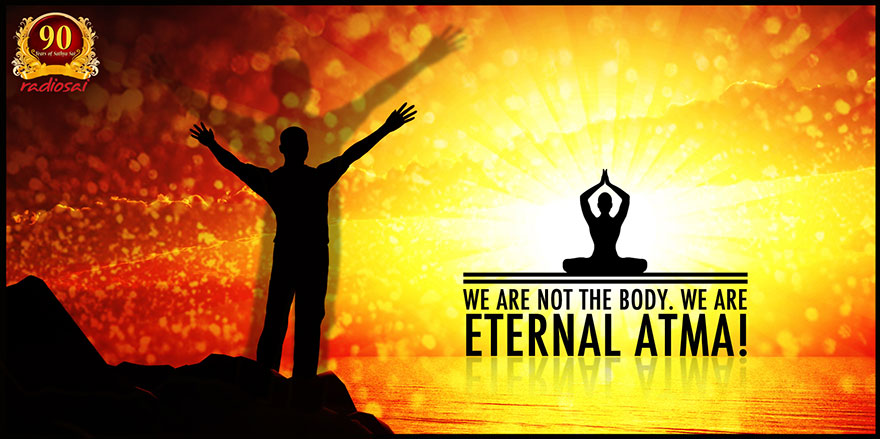 |
The body is transient, and exists in a world that is itself transient.
However, though the body, the action, and the world in which the action is performed are all transient, the flavour of the action must be Eternal!
These are the dots. Now how do we connect these? This is what Swami tells us:
Now although it is the transient body that performs the action in an equally transient world, and although the action itself might have been triggered by something that happened in the world, yet, something far beyond must govern our actions.
A Basic Principle must govern our actions, and that Principle is called Atmadharma.
Atmadharma simply means action that is in full conformity with the Nature of the Atma.
What is the Nature of the Atma? In simple words, Atma is Pure Love and Limitless Compassion.
In turn, this means that to the extent possible, all actions must flow from Pure Love and a sense of Divine Compassion.
Now for many, the word Dharma is nothing new. Indeed, until recently when religion and values suddenly become unfashionable, Dharma was an accepted and even treasured value. Yet, strange as it might seem, not many really understood what exactly Dharma meant and that includes even scholars well versed in the Gita. That is why we must really consider ourselves most fortunate that Swami has come to our rescue by explaining to us what precisely Dharma means.
Let me move on. What comes through very emphatically from all that has been said thus far is that though our actions might be in this world and be guided by worldly considerations, yet the Basic Principle guiding our actions no matter what they are, must be rooted without fail in the Atmic nature of the human being.
All this might sound very strange but let us not forget that it was God as Krishna who first said so to Arjuna, five thousand years ago. And it is that same God who is repeating that very same message to us; so we really need to pause and take all this in slowly.
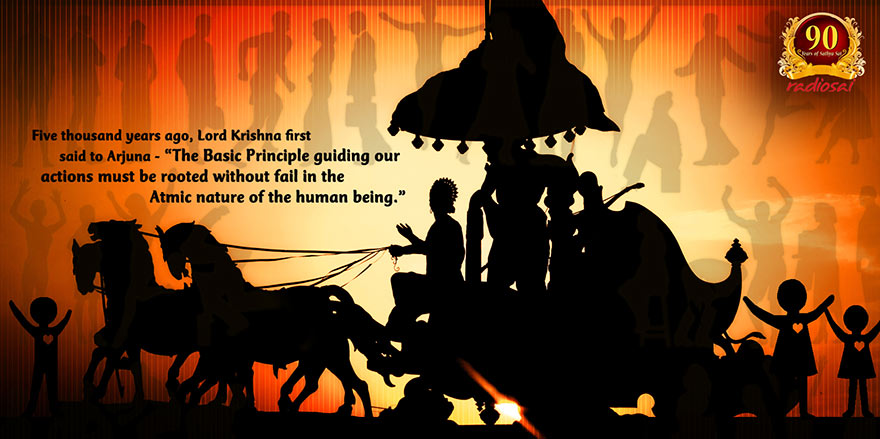 |
May be I can explain all this a bit better using an example. Recently, the issue of fake medicines and drugs has assumed alarming magnitude. Sad to say, most of the fake drugs are apparently coming from China and India. That India is involved is a matter of deep regret, considering the wonderful Dharmic tradition this country has boasted of for thousands of years. And when we remember that this is the land of Rama, Krishna, Buddha, Shirdi Baba, and of course our beloved Swami, this is absolutely shocking.
Let us set aside this painful aspect for a moment and go into the root cause for this problem. Now why are some people stooping so low as to make and market fake drugs? All for making a fast buck, as they say. The manufacturers of fake drugs argue, "What are you griping about? People are making a killing in the market all the time if they can get away with it. Is there any legitimate reason for crude oil to be as expensive as it really is? Take other commodities, like coffee, for example. People buy coffee beans at a very low price in some African countries and then sell that very same coffee at such a great price in the world market. People use cheap labour to make garments at very low cost and make huge profits by selling these. It is all a question of making profit; that is the way the market operates. Why should you be so aghast against this business? We are not compelling people to buy our products, are we?"
This is of course an ingenious kind of non-argument and yet this is the way things are. Of course, we can argue that unlike in the case of garments, carpets and so on, in the case of fake drugs, the health and indeed the life of the patient is at stake. Very true, but on the other hand, very often in the other cases like garments, for example, the labour conditions are deplorable; that is why such garment factories are called sweat shops. There, it is the labour that is being taken for a ride and cheated massively; and add to it the fact that poor working conditions often ruin the health of the workers involved. Who can say it is all Dharmic? The term 'market' does not convert Adharma into Dharma and that is what one has to be very careful about.
 |
Now let us consider the production of small arms, like machine guns and so on. There is a huge arms industry, mostly in the developed countries and they all do a thriving business in the sale of such weapons. It is argued that all this is legitimate, not forbidden by law, etc. Now cut to Africa, where millions have been killed in the last fifteen years or so, thanks to all kinds of conflicts between tribes, between countries, etc., most of the killings being gruesome. Indeed, right now, some of the people involved are being tried for genocide. People say, "Well, what's wrong with that? These are murderers and deserve to be punished." I am not disputing that. However, I would like to pick up another point.
Now the UN appointed a Committee to consider the entire issue of unregulated sale of small arms in huge quantities in Africa, which unquestionably aided and helped in promoting and sustaining widespread conflicts, killing, etc. The Chairman of the Committee was an African and the members included many from the developed countries. The Chairman pleaded, "You gentlemen from the rich countries, why don't you for heaven's sake refrain from selling your weapons in this part of the world?" The Chairman's appeal makes eminent sense but the reps of the rich countries strongly objected, making all kinds of arguments about having their market share, etc.
These are all in the public domain and I shall not go into the details. My intention is to place all this in the context of Atmadharma. You might wonder: "What can international trade in small arms have to do with Atmadharma?" Well, that precisely is the question I am now going to deal with because that would explain why and how Atmadharma is so very important, and how it affects everything, including matters that appear to be very remote and unconnected.
Let us get back to the arms bazaar. Why do people produce guns? Because, according to them, there is a market. They simply say, "Well, there is a demand and that is why we produce." And remember, the gun production business is largely in the affluent countries. So, they engage in arms business because it yields huge profit, However, when it comes to drugs like heroin and cocaine, since these drugs affect the affluent countries, suddenly, these merchants of death forget all about the profit motive and they say, "Look, these drugs are dangerous; they kill our young people. How can we ever tolerate them? Growing these crops is immoral and illegal, and conversion of the raw material into the final drug is utterly criminal." The reference is here to poor countries where the plants from which heroin and cocaine are made, are grown. What about the manufacture of guns and their sale? Don't guns kill people? Don't they promote the recruitment of child soldiers and so on? Of course they do, but all that is swept under the rug. This is what double standards are all about.
In short, when convenient, all kinds of arguments like market demand, etc., are used for manufacturing and making products that are manifestly undesirable, ranging all the way from violent films, pornography and whatnot right up to machine guns. However, when it comes to drugs there is a different yardstick used and that is where double standards come up.
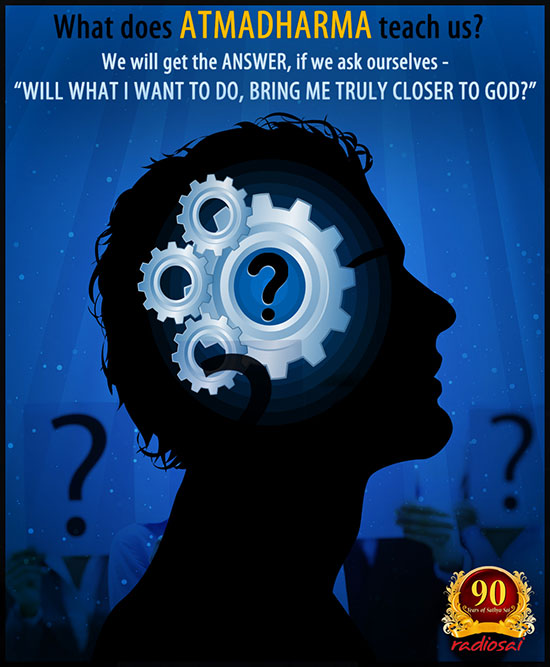 |
I do not want to appear to be partisan, favouring countries of the East as against the countries of the West. Rather, I want to look at the ENTIRE issue in the context of Atmadharma. Yes, that is right! Are you wondering what Atmadharma, which is a concept rooted in the Gita taught five thousand years ago, has to do with drugs and guns which did not exist then? You bet it does!
Let us go over this slowly! What does Atmadharma teach us? It teaches us that when we want to do anything, we should ask basic questions; I gave you earlier a sample of the kind of questions that one should ask. In this case, the relevant and most pertinent question would be, "Would the product I am making and trying to sell in the market – it could be narcotics or guns – is this based on selfishness or not? Would this product harm society in any way? Am I trying to cover up what I am trying to do under double standards? More than anything else, WILL WHAT I WANT TO DO, BRING ME TRULY CLOSER TO GOD?" Incidentally, that is the ultimate, acid test! When hard and tough questions are asked that way, there is absolutely no doubt the answer would come through loud and clear!
To repeat, Atmadharma is the guiding principle that would fine-tune our actions in such a way as to bring us closer to God. The purpose of life is to return to God – that is what Swami says and not me. If for the moment you do accept what I say about the purpose of life, then both growing poppy or making and selling guns are equally to be abhorred. One cannot make a case for just one of the two activities and condemn the other. In short, where Atmadharma is concerned, there is absolutely no room for any selfishness, and no double standards whatsoever, period! And, above all, if to God we wish to return – remember that is THE purpose of life – then Atmadharma is the compass we must always use.
May be all this leaves you a bit dazed; but don't worry, as we go along, things would become more and more clear. There is actually a simple way of remembering all this. Just watch the actions of Swami. Do we ever see Swami do anything that has even a trace of selfishness? No! Why? Because He is the very personification of the Atma. Is it at all ever possible for any Avatar to show hatred? No! Why? Because every Avatar is a personification of the Atma. And so on it goes, when we look at the whole matter in terms of compassion, Ahimsa, Kshama, etc. That is why Swami says, "Watch Me closely, for My life is My Message!"
Now you might say: "Hey! Wait a minute!! Swami is God and so He can do all that you say! We cannot. We are mortals, we are mere humans. We are not God; are you not forgetting that?" Well, I ask in return: "Are you, dear reader, not forgetting that Swami repeatedly tells us that we also are God, and that we must rise above the so-called human level so that the Divinity latent within us gets revealed? Has He not told us that the human form has been specially given to us so that we can follow Atmadharma and redeem our lives?"
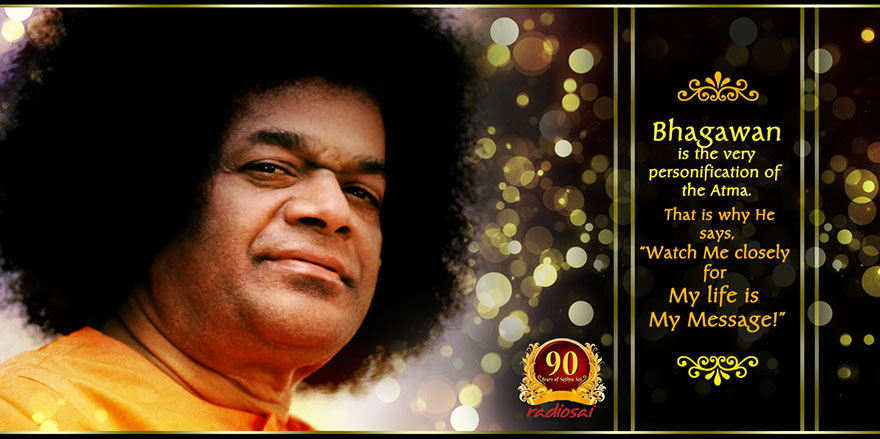 |
In the Gita Vahini, Swami says, we all live in the world, that we act on account of worldly considerations and within parameters spelt out by society, etc. All that is true. However, the basic motivation for the action must always be based on considerations of the Eternal – no escape from that.
Well, that's all for now. Hope you did not find that dose too heavy. Good luck and see you again next time.
- Radio Sai Team
Posted on: June 13, 2015
Loving Sai Ram and greetings from Prasanthi Nilayam.
Last time, I spoke to you mainly about Atmadharma. As a concept, it is very old but keeping in mind the fact that you might be hearing about it for the first time, I took great pains to explain it in as much detail as I could. In spite of that, you are perhaps getting the feeling that this Atmadharma is difficult stuff and not quite meaningful for today's world. That is one mistake we just cannot afford to make. By way of driving home the fact that Atmadharma is not difficult, Swami says that simple acts that fill our daily life could be made to have a deep relationship to Atmadharma, if only we choose. Is this really possible? That is an important point but I shall discuss that later; for the moment, let us hear what Swami has to say next:
"If, in your daily avocations, you translate the Real Values of Eternal Dharma into love-filled acts, then your duty to the inner Reality, theAtmadharma is also fulfilled. Always build your living on the Atmic Plinth; then, your progress is assured."
Let me restate the above quote somewhat differently, using Swami's own words, more familiar to us. Does not Swami often tell us: 'Start the day with Love; fill the day with Love and end the day with Love'? That exactly is what the quote I have offered from Dharma Vahinialso says.
Let us now look at this a little more deeply. Take a simple act like worshipping an idol. This is something people still do, even in this internet age. First, let us hear what Swami has to say about that. Listen please.
"Making God into stone - that is the effort being made today! How can such effort lead to Truth, when the real task is to see the stone as God? First, the Form of the Godhead has to be meditated upon and imprinted on the consciousness; then, that Form has to be conceived within the stone and the stone forgotten in the process, until the stone is transformed into God."
Basically, what Swami is saying is that one must see God in stone and NOT make God into stone. This is something we must reflect carefully on. There are two things here – the symbol and the larger concept that the symbol represents. The stone sculpture is the symbol while God is the Fundamental Principle. If people are made to think that God is just the stone idol and nothing else, then it can be quite dangerous. A state of narrow-mindedness can develop wherein the Principle is totally forgotten and one is trapped in not only trivialities but also in dangerous myths, leading in turn to bigotry, hatred etc. I hope to return to this important point later. Meanwhile, let us hear again from Swami:
"In the same way, you have to imprint on your consciousness the basic Dharma, the Fundamental Fact of Atma as the only Entity; and, then, filled with that Faith and Vision, you have to deal with the manifold world of objects, its attractions and impingements. It is only thus that the Ideal can be realised. If this is done, there is no danger of the Authentic Meaning getting diluted, or Atmadharma losing its lustre."
Swami is reminding us that while the Atma is one, it manifests in the universe with incredible diversity; the different entities may appear to have their own distinctive individuality but in truth, they all are the manifestations of One Grand and Universal Principle. It is to highlight this that Swami often tells us: 'Cows are many but milk is one; jewels are many but gold is one' and so on.
Let us dig a bit deeper and consider the statement, 'Jewels are many but gold is one.' Suppose, for the sake of argument, the jewels have all been made of copper and simply plated with gold. Clearly the gold-plated jewels would be worth far less than those made with pure gold. In the same way, actions that appear Dharmic but are only superficially so, would be worthless compared to those based onAtmadharma. I mean, suppose a man gives charity of say a million rupees, merely so that his name appears in the newspapers; would that have any spiritual value? None at all; on the other hand, the charity of a hungry beggar who shares his meagre meal with another hungry soul is far superior – that is the point Swami is making.
Back to Swami, and let us hear His next quote.
"What happens when a stone is worshipped as God? The Unlimited, the Ever-present, the All-pervading-immanent Entity, the Absolute, is visualised in the Particular, in the Concrete. Similarly, Dharma, which is Universal, Equal and Free, can be spotted and tested in a single concrete act. Do not be misled by the idea that this is not possible. Are not many things difficult accomplished by you, things that only increase your anxiety and fear? If man is wise, can he not take up instead things that are more worthwhile, which give him peace of mind?"
The basic point Swami is making is simple. He says in effect: "Listen, the devotee may worship an idol, but the idol is simply a device for the devotee to commune with God who is really Infinite. Infinity is a concept difficult for simple folk to grasp but through loving worship of even a symbol, their Love can blossom enormously." That is the point Swami is really making. Let us try to understand that further.
Say there is this genuine devotee who sees his God say, Krishna, in the beautiful idol he worships lovingly. Let us further suppose that this devotee offers some sweet dish to Krishna, and afterwards shares that lovingly with other devotees as Prasaadam. The devotee's love for Krishna now spills over to real people, his fellow devotees, and this happens all the time in many ways. In other words, filled with love for Krishna, the devotee is eager to share his love with others at every conceivable opportunity, filled as he is with compassion for those who suffer. The point simply is that while the worship is supposed to be offered to a so-called lifeless idol, the devotee all the time visualises something that the idol represents – namely Krishna, the Embodiment of Divine Compassion, Divine Love, Divine Grace, Divine Security and so on. That is what transforms the devotee. In short, the idol is merely a switch that turns on love and similar virtues in the devotee.
Keeping this in mind, let us revisit the quote of Swami that I offered a short while ago, about jewels and gold. Basically, Swami says that the general can be seen in the particular; conversely, the particular must become a symbol of the general. Thus, while Atmadharmamight seem a vague and nebulous concept to ordinary folk, even simple people can understand selfless service, compassion, etc. and by engaging in loving and selfless acts such people can, unknown to them, actually practice Atmadharma.
Say there is a hungry old woman shivering in the cold. A person appears and gives the old woman a blanket and also some hot soup. For her, that benefactor is God Himself! In worldly terms, what this old woman sees is merely a human benefactor; however, for that woman, at that moment, what the man is giving is also a manifestation of the love and compassion of God – that is what I mean by seeing the Universal in the particular.
"In short", says Swami, "don't get turned off by the jargon. Seeing the Divine even in simple acts is possible and not as difficult as we imagine." Swami adds, "You handle and face all sorts of difficult challenges in your professional life and at the end of it all, you find yourself drowned in anxiety and tension. If you can take on such difficult tasks why not do something to get more familiar withAtmadharma, which would take you very far indeed?" In other words, if we find Atmadharma to be a difficult concept, it is simply because we are not spending even a minute to understand it; if the effort is made, the concept is actually quite easy to follow.
Let us listen a bit more:
"Therefore, endeavour first to become Free. That is to say, as a preliminary to successful living, cultivate Faith in the Atma as the core of your personality and then learn and practice the discipline necessary to reach down to that core. With that qualification acquired, you can engage fully in worldly activities, following the Dharma prescribed for their regulation. Then you become a moral individual, a Dharmapurusha."
I hope you heard that carefully, and locked on to the phrase become Free. That is crucial. Freedom is something that all individuals long for. Normally, people want to be free of things that hold them back in daily life; they may feel cramped due to lack of money, lack of a job, lack of a car and material needs like that. Or else, there could be constraints related to people – it could be a strict father, a nasty mother-in-law, or an equally difficult daughter-in-law, a mean boss, a dictator who is making life into slavery, discrimination of some sort or the other, and so on. Young people all the time feel that they are being constrained by parents, elders, teachers and so on, and want to do the in-thing, and what the media proclaims to be the choice of the peers.
Yes, this is the way humans everywhere normally react to checks and constraints; these are facts of life and cannot be dismissed. However, when Swami is talking of being Free, He is referring something much beyond all these; what Swami is referring to is not well understood, and that is what I want to focus on right now.
You see, where Spirituality is concerned, being Free means something very different from what I have been referring to. I know this would be difficult to understand and so let me take you through all of it slowly. Consider a young person who feels heavily constrained and chocked by social norms of behaviour etc. etc. This young person therefore takes to drugs in order to feel free. Yes, taking drugs does make the person feel high, at least for a while, and when the person is intoxicated, the person does feel he or she is 'free'. But how long does that feeling last? Not very much; and so this person goes back again to the drugs to get high. And you know what happens after that; pretty soon the person becomes addicted and a SLAVE to the drug. Where is the freedom now? There never was any freedom to start with; it was a mere illusion, that is all. What has happened is that the person mistakenly thought he or she was going to be free by doing something, whereas what was really happening was that the person was actually walking into the trap of bondage!
If you think about it, there are many things that people hanker after, in search of freedom as they see it, be it gambling or drinking or whatever; ultimately, all these pursuits lead them to some kind of bondage; in turn, this leads to depression and alas, sometimes, even to self-destruction. In short, actions that are supposed to set free or be the symbols of freedom [so-called] actually enslave! This is the honest truth, but then truth is so inconvenient to accept that people tend to rubbish such an analysis. Nevertheless, Truth is Truth, however unpleasant it might sound to people who do not wish to face it.
So, what then is real freedom and what does it REALLY mean to be free? Swami has given the answer to that as clearly as one could. It all starts with a simple fact:
A thing is free if there is no price to pay, or there are no consequences to face.
I mean, a person could brag, "I have a gun and I am free to kill!" People do feel this way and also go out and kill, but then most of them get caught, and when that happens, the price extracted is heavy. One can give many such examples and the bottom line is that THERE IS NO SUCH THING AS A FREE LUNCH. You might then ask: "If that is so, what then is truly IS free? What exactly is true freedom?"
Here is the answer.
Freedom is that state wherein the actions that one performs carry NO PRICE AND DO NOT LEAD TO ANY PAINFUL OR UNDESIRABLE CONSEQUENCES. That is what happens when one follows Atmadharma; such an action is in perfect harmony with Divinity and there is no Karma attached to it. On the other hand, such actions lead eventually to union with God and therefore Permanent Bliss. To put it differently, man thinks that yielding to Kama, Krodha etc. is what confers freedom. To say "I am free to follow my desire," or "I am free to get angry when I like," etc. is not true freedom. On the contrary, being free from these six deadly enemies is true freedom; it is only in such a state one is free to act in accordance with Atmadharma, and such actions alone do not carry a 'price tag'. On the other hand, they lead to Eternal Bliss, freeing one for ever from the alternating cycle of pleasure and pain.
To put it simply:
Freedom is when one is able to follow Atmadharma without experiencing the impediments placed by Kama, Krodha, etc.
We get a better insight into all this from the next excerpt. Let us listen. Swami says:
"Those who hold the physical objective world as the all of life and the body as the Self, lead but wasted lives, as meaningless as making God into stone. Making the stone into God is the holier, more wholesome task."
The quote is small but full of meaning; so, let us try and absorb what Swami is saying. First of all, there are two entities - the transient world that appears to be very real, and then something called True Reality, which, to all of us appears very unreal. Yet, according to Spirituality, this other thing that is so intangible is actually Real because it is Eternal!
Used as we are to living very much in the world and being generally very ignorant about the Eternal Atma that is supposed to be our Real Self, we do not believe when we are told about the Atma, True Reality etc. We ask all sorts of questions like: "What is this Atma? We cannot see it and even if it does exist, it does not seem to be relevant to our daily life. Why then bother? What is the big deal?"
It all seems so very puzzling; there is something we see constantly before our eyes, and yet it is declared to be unreal. On the other hand there is something we do not ever see, and yet his unseen is declared to be the True Reality! No wonder it all seems so confusing!
Swami helps us out in the following way. He says [effectively] "Consider a stone idol that is supposed to represent God. Is God just the idol, or is the idol a mere symbol of God? If God is only the idol, then, God is finite; but we know God is not finite. Again, the stone can weather and crumble with age due to thermal cycle and what not. Can God be wiped out by weather? Obviously not.
There is thus a difference between seeing God as only a piece of stone and seeing the stone idol as a representative symbol of God the Eternal, in a transient world." Hope you get the point, which is that one must not confuse the symbol with what the symbol stands for or represents.
Let us carry over this idea to ourselves. You see, there are really two aspects to our personality, the body and what the body actually represents. The body is the symbol and it is the temporary aspect; therefore, it is not very important. On the other hand, what the body represents is the Eternal Atma, and that is what is important. However, because we cannot see theAtma, we tend to dismiss it totally, and instead regard the body to be our true Self. Vedanta says that is not correct; yes, the body IS important, and has been given to us with a purpose; however, it is not everything; at best the Lower Self. The Atma, on the other hand, is everything and it is the True of the Higher Self.
Thus, to believe that we are merely the Lower Self is as bad as saying that God is only the stone idol. On the other hand we should say, the body is there no doubt but that is only a transient aspect of our Real Self; the latter is the Atma, which, if one prefers can also be called the Higher Self. The latter point of view is like saying, "Yes God is in the stone idol, and in that sense the idol is a symbol that represents God. However, the idol does not exhaust God! That is because God is everywhere and always is unlike the piece of stone which would cease to exist when the earth ceases to exist."
I hope all this helps you to understand why Swami says we must see God in the stone rather than the other way about. Keeping that in mind, let us proceed a bit further. To Swami once again, who says:
"So too, seeing the Atmadharma in every single act of yours transforms it into an act of worship, elevates it and removes its binding characteristic. If the duties of worldly life are done with no regard to genuine Sathya and Dharma, it is as unholy as treating God as stone."
This is an interesting quote. Swami says that just as we have the option of either making God into stone or seeing God in stone, so too, we can reduce genuine worship of God into a routine chore, or alternately, we can even make ordinary work into worship. When we do the latter, we are really following Atmadharma – that is in essence what Swami is saying. The question now becomes: "How does one convert routine work into worship?" That I shall may discuss later but meanwhile, I do hope I have not totally lost you and that you are with me at least part of the way!
See you again next time, and till then, God be with you. Till then, take care, and may God be with you. Jai Sai Ram.
- Radio Sai Team
What do you think about this Musings? Please let us know by writing in to h2h@radiosai.org or you may leave your thoughts in the comments section. Do not forget to mention your name and country.
SOURCE:
http://media.radiosai.org/journals/vol_13/01JUN15/Musings-on-dharma-vahini-04.htm





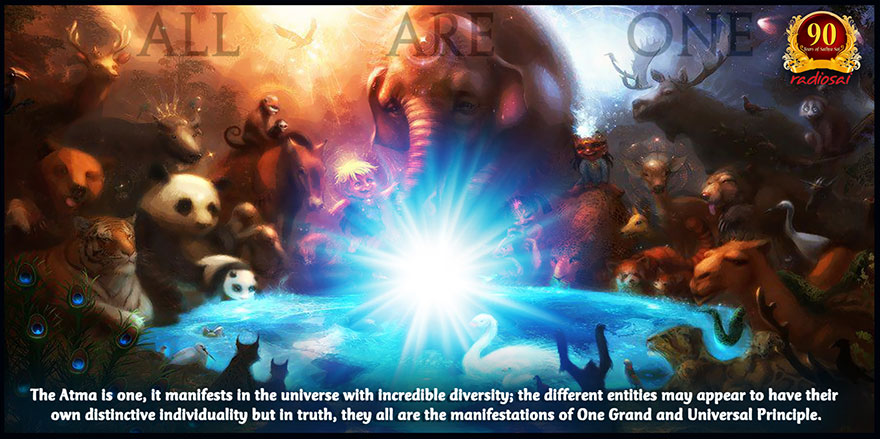
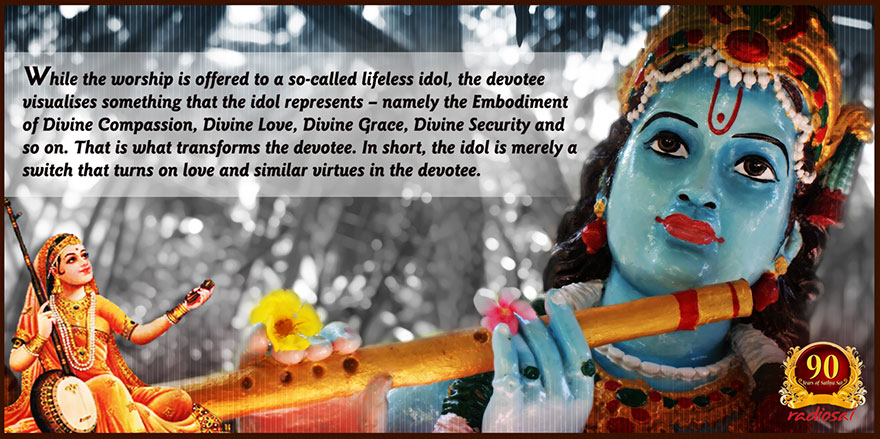
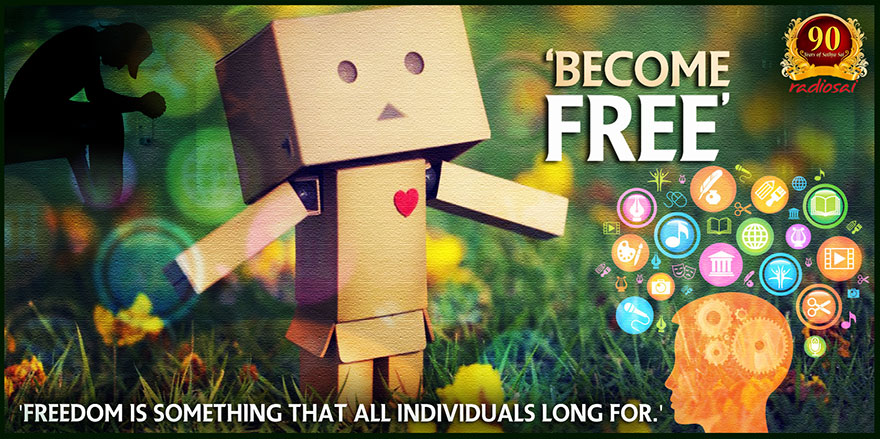
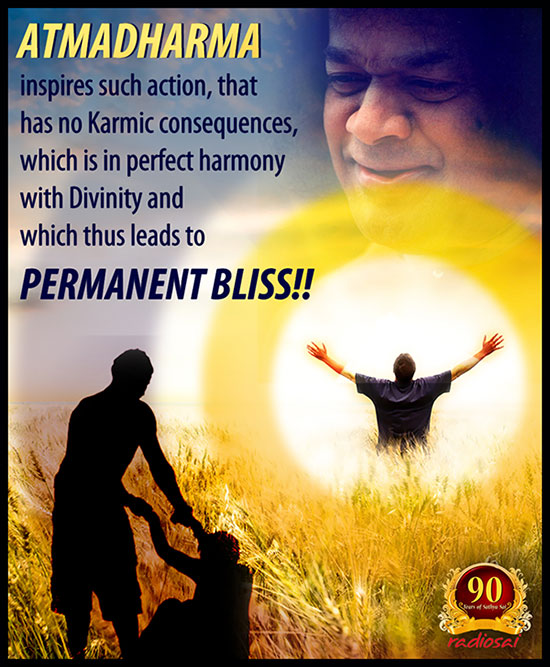
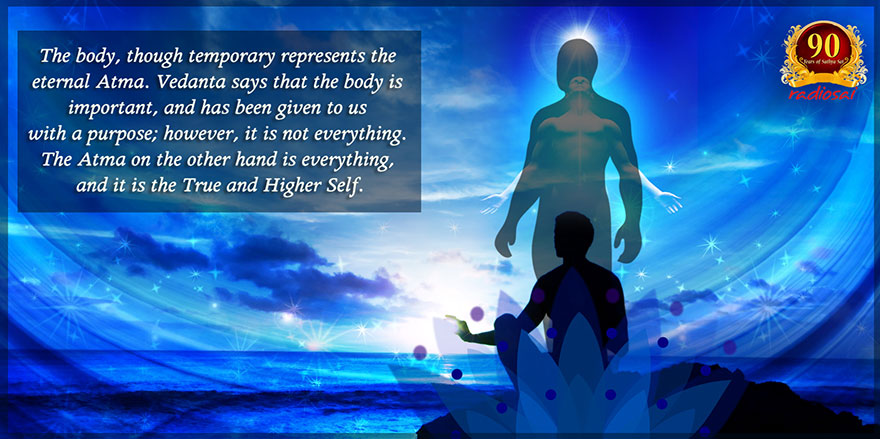
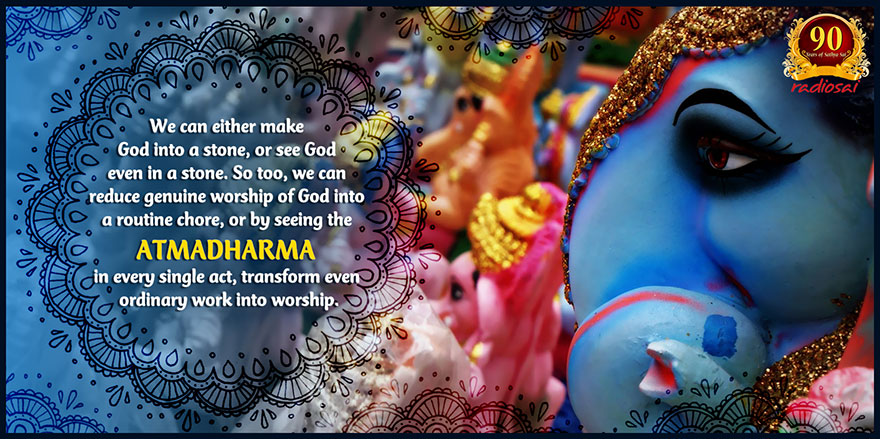












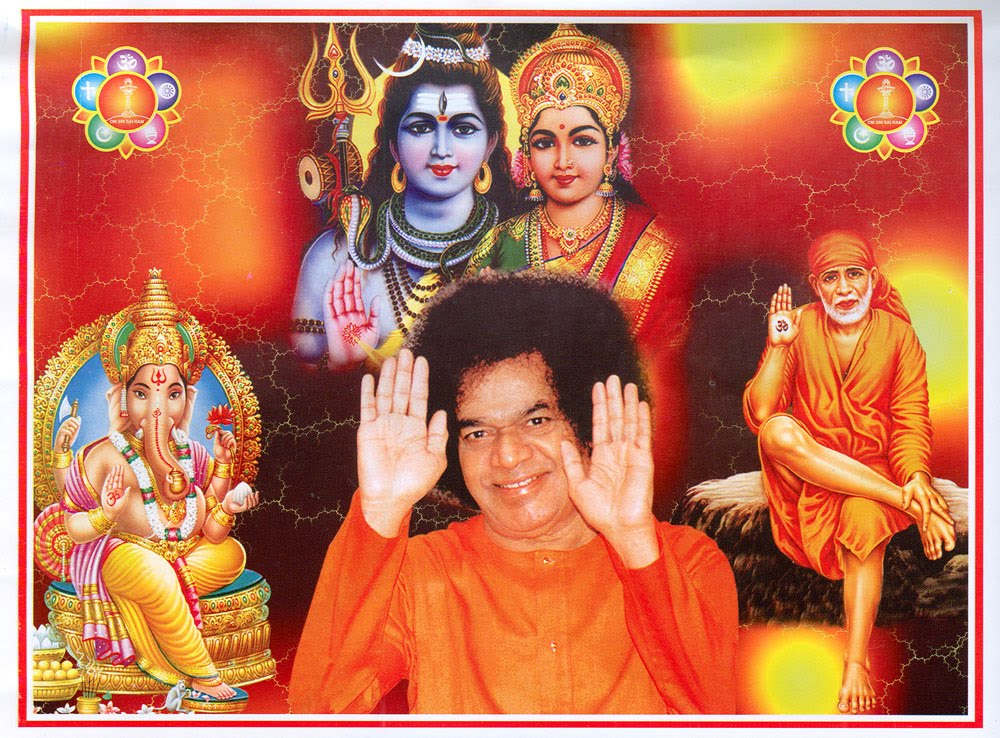






No hay comentarios :
Publicar un comentario